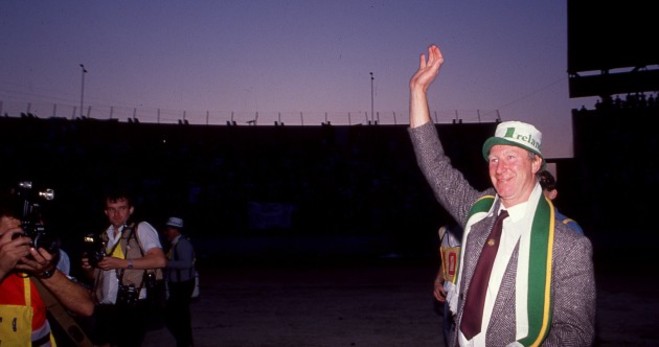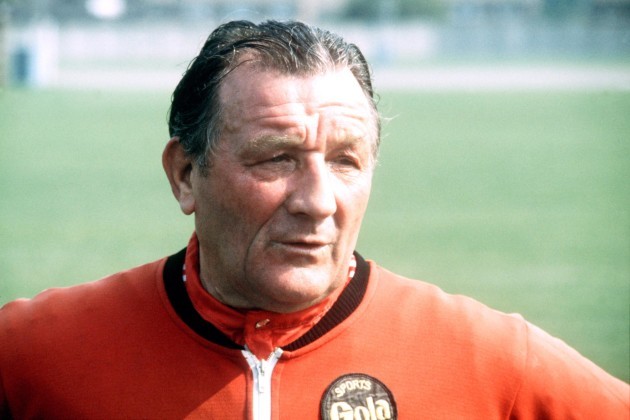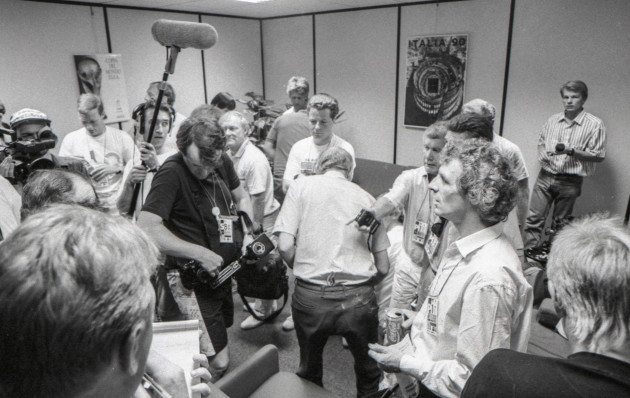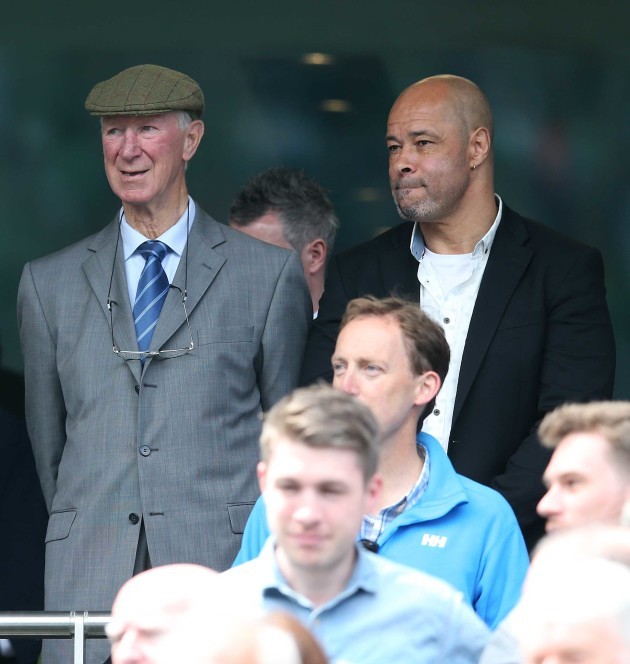Updated at 02.20
WHEN PEOPLE assess Irish football, there are two prominent time periods — before Jack, and after Jack.
If there were a footballing equivalent of Mount Rushmore on this isle, Jack Charlton’s face would undoubtedly belong there.
Yet amid the inevitable accolades that greeted news of his death at the age of 85, it is easy to forget how controversial and divisive a figure he was in the early days of his Ireland reign.
Charlton popularised the sport in this country and ensured millions fell in love with it.
Of course, that is not to suggest football had been irrelevant or entirely impoverished in Ireland before his arrival.
A number of top-class footballers had been and gone prior to that idyllic period.
Other coaches such as John Giles, Liam Tuohy, Mick Meagan and Eoin Hand helped lay the foundations for future success.
“That does piss me off,” Hand told The42 in a 2017 interview. “When ignorant people say it all started with Jack. They haven’t a clue.
“Okay, Jack was the one that got the breaks, like Gary Mackay scoring the goal for Scotland to beat Bulgaria.
But that’s what happens in sport. You take a 42-game league campaign — people moan about this and that, but over a season, it levels out. And Jack was the one that happened to be in charge (of Ireland) when it levelled out.”
Hand indeed was extremely unlucky not to oversee Ireland’s progression to the 1982 World Cup, with an infamous refereeing performance against Belgium a significant contributing factor to the agonising failure, while there were other near misses before then.
However, Charlton took over an Irish team that had just endured a dismal campaign.
In the 1986 World Cup qualifiers, the Boys in Green won just two of their eight matches, culminating in a demoralising 4-1 loss to Denmark at Lansdowne Road that consigned them to a fourth-place finish in a five-team group.
Charlton wasn’t exactly coming from a position of strength either. He had enjoyed some success in club management, guiding Middlesbrough to the top flight and winning the 1974 Manager of the Year award all in his first season in charge.
In addition to four years at Boro, he spent six at Sheffield Wednesday, helping the Owls win promotion out of the Third Division.
However, his most recent managerial job had been an unhappy 14-month stint at Newcastle United.
In a pre-season friendly against Sheffield United, the club’s fans booed him and chanted: “We hate Charlton.” The furious coach responded: “The crowd will get exactly what they want.” And he promptly quit the role.
After the Newcastle experience, Charlton vowed never again to work in club management. A profile piece in the Evening Echo shed light on his reasoning.
“I spoiled myself when I took that year off after Sheffield Wednesday,” he explained.
I learned that there was much more to life than working seven days a week in football and driving endless miles and hours at night on the motorways to watch matches.
“Worst of all, I had missed my kids growing up, and that was a big mistake.”
The World Cup winner’s first stroke of luck with Ireland had been getting appointed in the first place.
Billy McNeill, Brian Clough, Ron Saunders, David Pleat, Jim Smith, John Giles, Bob Paisley and Liam Tuohy had been among the names linked with the vacant position.
In the end, it came down to an FAI vote, with Charlton, Paisley, Giles and Tuohy in contention. A convoluted process resulted in the Northumberland native pipping the Liverpool legend to the post and becoming the first non-Irishman to manage Ireland.
Charlton’s initial salary was reported as £25,000 per annum. He was also earning money for TV appearances among other gigs, but even in that era, it was considered a low wage for such a high-profile position.
“There is a tremendous professional pride in doing a job and doing it well. I do not want any rewards in the financial sense — just total satisfaction on a personal level,” Charlton would comment on this matter.
Nonetheless, the feeling following Charlton’s appointment was hardly one of unequivocal optimism.
Karl MacGinty, writing in the Evening Herald, gave a sense of the mood: “The confrontation between those supporting Giles and Tuohy has as much to do with the FAI’s complex internal politics as football.
“That two such capable Irishmen should be passed over is an aberration, but one for which Charlton cannot be blamed.
“The Englishman is now in the invidious position of being a compromise manager without full support in the corridors of power or, one feels, on the terraces.
In these unhappy circumstances, he will have to achieve success in the short term, or else. In Irish soccer’s current climate, that sadly seems inevitable. Good luck, Mr Charlton. But I don’t envy you.”
Charlton, of course, didn’t always help himself. “I have no idea where all of the Irish players are, or who they are,” he said upon being appointed.
An abrasive approach when it came to dealing with journalists and a tendency to get the names of footballers wrong or forget them entirely gave his detractors further fuel.
Liam Brady was referred to as “Ian” until the midfielder pointed out that Charlton had him confused with the man who carried out the Moors murders. Barry Murphy, a Bohemians footballer drafted into the squad during one get together, was regularly referred to as “Jerry”.
Murphy, though, was perhaps somewhat fortunate to be in the squad. Charlton admitted to never having seen him in action, but relied upon the inexperienced player when stuck for a defender.
“I rang up Mick Byrne and asked him who the best centre-half in Ireland was,” Charlton explained, when questioned as to why he had selected Murphy. Of course, given his Bohs’ affiliations at the time, Byrne perhaps was not the most neutral person to consult.
For all the negativity emanating from certain quarters, Charlton did have at least one person backing him early on.
“For the first time in years, we can look forward with optimism,” Eamon Dunphy wrote in the Sunday Independent.
The former Ireland international continued: “Charlton is different, a non-conformist who is honest, belligerent, insensitive and bloody-minded.
“Jack doesn’t give a damn what anybody thinks.
“He is, in other words, the stuff of which good wartime leaders are made. He is MacArthur rather than Gandhi.”
In an interesting contrast with his later infamous criticisms of the team, most notably for the way they played at Italia ’90, Dunphy also dismissed characterisations of Charlton’s style of football as “barbaric”.
On a similarly controversial topic, it was Hand who had actually tipped off Charlton about the eligibility of promising Oxford pair Ray Houghton and John Aldridge, yet the incoming manager attracted the brunt of the criticism for selecting so many footballers born outside of Ireland. There was just 11 Irish natives out of the 26 players picked in Charlton’s first squad, prompting one journalist to write: “Frankly, I believe the FAI are making a mockery of the Fifa rule that allows players born abroad to appear for Ireland when they have the most tenuous connection with this country.”
The Ireland boss, though, would offer an eloquent riposte to this criticism years later in his autobiography.
Every player we brought into the squad considered himself Irish… Had it not been for the economic circumstances, which forced their parents or grandparents to emigrate, they would have been born and reared in Ireland. Should they now be victimised and denied their heritage because of the whims of journalists? I think not.”
Charlton was far from unequivocally popular among the players either initially. His style of football was about as far away from Pep Guardiola as possible, but what he had in common with the Catalan coach was a dogmatism and an insistence that football should be played a particular way. Those who appeared reluctant to conform to his system were overlooked and in some cases, effectively ostracised.
Liam Brady, David O’Leary and Ronnie Whelan were among the top stars who would likely have enjoyed more game time under most other managers. Deploying Paul McGrath in midfield was likewise seen as an eccentric call.
Meanwhile, Ireland’s Euro ’88 qualifying group looked tricky on paper – Belgium, Bulgaria and Scotland had all qualified for the 1986 World Cup. The Belgians appeared particularly formidable, having reached the semi-finals in Mexico.
And the first competitive fixtures of the Charlton era did not necessarily suggest great times were on the horizon, notwithstanding a morale-boosting 1-0 win over Brazil in a memorable Lansdowne Road friendly.
A creditable 2-2 draw away to Belgium was followed by a 0-0 stalemate at home to Scotland. A 1-0 win in the reverse fixture would prove vital, but Ireland failed to build on the momentum from this result, losing 2-1 away to Bulgaria and drawing 0-0 in the home fixture with Belgium.
Less-than-convincing 2-0 and 2-1 wins over group minnows Luxembourg did little to inspire confidence.
The dwindling optimism was indicated by the disappointing crowd of 26,000 at Lansdowne Road for the team’s final qualifier — a 2-0 win over Bulgaria.
Even after this victory, few people believed Ireland would reach the Euros, as they were reliant on an unfancied Scotland team prevailing away to the Bulgarians.
The team’s “drab, uninspired football” was criticised.
A Liam Tuohy column in the Evening Herald, appearing with the headline ‘Charlton’s tactics flop,’ was heavily critical of the team and in particular, its embattled manager.
“The Garryowen tactics of the Irish football team under Jack Charlton are totally unsuited to the demands of international football – particularly at home,” Tuohy complained.
This view was shared by other football purists who wanted the national team to be playing a more sophisticated brand of football.
Yet Gary Mackay’s 86th-minute goal in Sofia drastically changed people’s outlook. Charlton had gone from villain to hero overnight, owing largely to a game he had no influence over.
Qualifying for a first-ever major tournament went a long way towards winning over a sceptical public and unforgiving press pack.
Suddenly, everything, including the deeply pragmatic style of football, had been vindicated.
Soccer, it should be noted, had not been unanimously loved in Ireland prior to Euro ’88 and Italia ’90.
The attitude of some people was epitomised by comments from the then-GAA President John Dowling. Asked if he would be watching the Boys in Green’s opening Euro ’88 encounter against England, the administrator was quoted by the Irish Examiner as saying: “I won’t watch any of the games. I’m too busy to look at it. I don’t wish to criticise, but I don’t like soccer as a game.”
Yet thousands of Irish fans travelling over to Germany disagreed and the clash against England was where it truly started to feel like the start of something special.
Some snarky comments by the opposition’s media were a feature of the build-up to the big game.
Ireland were dubbed the “Wimbledon of international football”. Derek Potter of the Today newspaper described the squad as “a collection of misfits and mercenaries”.
And while England were considered among the favourites to triumph, for Ireland — at a time when there were just seven slots available to join hosts Germany at the Euros — simply qualifying represented a major success, and anything else was a bonus.
After Ray Houghton famously put the ball in the English net early on, Charlton’s men survived wave after wave of English attack. A combination of poor finishing and Packie Bonner’s goalkeeping brilliance helped them narrowly over the line.
“There are times when you think somebody up there likes you,” said an overjoyed Charlton afterwards, having just overseen what was at that point certainly the most famous win in the country’s footballing history (he would later oversee a few more contenders to that claim subsequently).
Euro ’88 has always been remembered as a tournament where Ireland won a game they should have lost, drew a match they should have won and lost a fixture they should have drawn.
Consequently, an exceptional performance in the second match yielded an anti-climactic 1-1 draw with the Soviet Union, in a fixture most notable for Ronnie Whelan’s outstanding scissors-kick goal.
Thereafter, Ireland were eight minutes away from sealing a spot in the semi-finals, before a fortuitous Wim Kieft winner saw eventual champions the Netherlands progress instead.
The defeat did little to quell the sense of joy that the tournament provided the people of Ireland with.
The squad were given a heroes’ welcome home, thus truly beginning an era of unprecedented glory in Irish football.
While ultimately eclipsed by Italia ’90, it was Euro ’88 that sealed Charlton’s reputation as a manager of considerable renown. Even if the iconic figure had decided to quit there and then, he would have been remembered as a trailblazing Irish coach.
The FAI’s shock decision to appoint him now looked like a masterstroke. Later that year, Charlton was second only to Dutch icon Rinus Michels in a list of the top international managers put together by the respected World Football Magazine.
A litany of sponsorship deals and awards followed for the former Leeds United player.
Ireland, for years perceived as underachievers on the international stage, were now known as a force to be reckoned with.
Charlton, a footballing visionary and natural leader, had inspired a culture change.
It was the start of a long love affair that lasted until the legendary manager’s sad passing, announced on Saturday.
After eventually departing the role on 22 December 1995 — 10 years on from his appointment — he was gone but hardly forgotten. Two decades after one of the darkest nights of his reign came one of his proudest moments. The Lansdowne Riots in 1995 were as depressing as the first home match between Ireland-England since in 2015 was uplifting. The latter game itself was a dour spectacle, with the joy from the day deriving purely from the unexpected appearance of Charlton, whose emergence onto the field prior to kick-off prompted a rapturous response from the Aviva crowd and confirmed that his popularity among the Irish public was as strong as ever. It was a fitting final scene for a man who left an indelible legacy.
Amid an era in which the Troubles cast a shadow over the nation, it was a remarkable testament to the power of sport that it was an Englishman who brought millions of Irish people together like never before.




